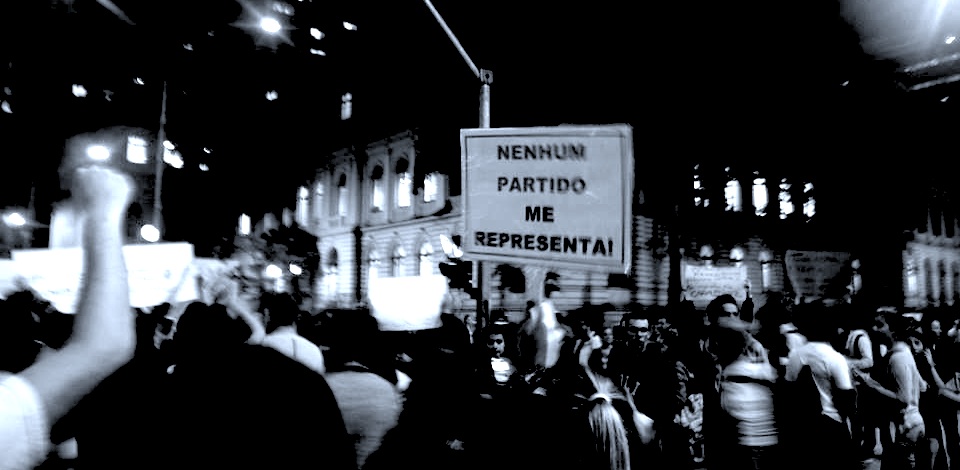References
Ayers, A. and Saad-Filho, A. (2013) ‘Democracy Against Neoliberalism: Paradoxes, Limitations, Transcendence’, Critical Sociology, online first.
Boito,A.andMarcelino,P.(2011)‘DeclineinUnionism?AnAnalysisoftheNewWaveofStrikesinBrazil’, Latin American Perspectives, 38 (5), pp.62-73.
Feijó, C.A. and Carvalho, P.G.M. (1998). Structural Changes in the Brazilian Economy: An Analysis of the Evolution of Industrial Productivity in the 1990s, http://isi.cbs.nl/iamamember/CD5- Mexico1998/document/CON_PA~1/Cp10apar.doc.
Medeiros, J. (2013) ‘O PT e as Classes Sociais no Brasil: Reflexões após Dez Anos de “Lulismo”’, http://novo.fpabramo.org.br.
Morais, L. and Saad-Filho, A. (2011) ‘Brazil beyond Lula: Forging Ahead or Pausing for Breath?’, Latin American Perspectives, 38 (2), pp.31-44.
Morais, L. and Saad-Filho, A. (2012) ‘Neo-Developmentalism and the Challenges of Economic Policy-Making under Dilma Rousseff’, Critical Sociology 38 (6), pp.789-798.
Pochmann, M. (2006) ‘Mercado Geral de Trabalho: O Que Há de Novo no Brasil?’, Parcerias Estratégicas 22, pp.121-144.
Pochmann, M. (2010) ‘Estrutura Social no Brasil: Mudanças Recentes’, Serviço Social & Sociedade, 104, pp.637- 649.
Pochmann, M. (2011) ‘Políticas Sociais e Padrão de Mudanças no Brasil Durante o Governo Lula’, SER Social, 13(28), pp.12-40.
Pomar, W. (2013) ‘Debatendo Classes e Luta de Classes no Brasil’, http://novo.fpabramo.org.br. Saad-Filho, A. (2007) ‘There is Life beyond the Washington Consensus: An Introduction to Pro-Poor
Macroeconomic Policies’, Review of Political Economy 19 (4), pp.513-537. Saad-Filho, A. (2012) ‘Neoliberalism, Democracy and Development Policy in Brazil’, in K.-S. Chang, B. Fine and
L. Weiss, Developmental Politics in Transition: The Neoliberal Era and Beyond. London: Palgrave. Saad-Filho, A. (2013) ‘Mass Protests under “Left Neoliberalism”: Brazil, June-July 2013’, Critical Sociology 39 (5),
pp.657-669. Saad-Filho, A. (2014) ‘Brazil: Development Strategies and Social Change from Import-Substitution to the “Events
of June”’, Studies in Political Economy 94, pp.3-31. Saad-Filho, A. and Morais, L. (2014) ‘Mass Protests: Brazilian Spring or Brazilian Malaise?”, in: L. Panitch, G. Albo
and V. Chibber (eds.) Socialist Register. London: Merlin Press. Santos, J.A.F. (2001) ‘Mudanças na Estrutura de Posições e Segmentos de Classe no Brasil’, Dados 44 (1),
http://www.scielo.br/scielo.php?script=sci_arttext&pid=S0011-52582001000100005
Endnotes:
[1] This article is an updated version of Saad-Filho (2014). [2] For a detailed description of the protests, see Saad-Filho (2013) and Saad-Filho and Morais (2014). [3] For a review, see Saad-Filho (2012). [4] Pochmann (2011, pp.22, 24); see also Pochmann (2006, pp.123-125).
[5] Pochmann (2010, pp.640, 648). [6] Pomar (2013, p.34). [7] Pochmann (2011, p.16). [8] See Feijó and Carvalho (1998). [9] Pochmann (2006, p.137).
[10] Pomar (2013, p.41). [11] See Santos (2001). [12] Pochmann (2011, p.16). [13] Pomar (2013, p.32).
[14] The following analysis of the material interests of broad social groups is not meant to read off individual proclivities from fixed class positions, or to suggest that social classes or strata ought to be either self-conscious o politically united. Instead, it seeks to illustrate how conflicting economic interests and social relations in Brazil can support distinct political platforms and rival economic policy programmes which, in turn, tend to be expressed through alternative political parties, organizations and movements.
[15] See Morais and Saad-Filho (2011, 2012). [16] Saad-Filho (2007). [17] Pomar (2013, p.10). [18] Boito and Marcelino (2011, p.62).
[19] See http://www.dmtemdebate.com.br/abre_noticia_colunista.php?id=20; this source reports lower trade union membership than the Anuário dos Trabalhadores (www.dieese.org.br).
[20] See Boito and Marcelino (2011, pp.66-67) and www.dieese.org (Balanço das Greves). [21] Medeiros (2013, p.64). [22] Pomar (2013, p.42). [23] See Saad-Filho and Morais (2014).
[24] For an anecdotal account of the demonstrations, see http://www.rededemocratica.org/index.php? option=com_k2&view=item&id=4637:a-ditadura-n%C3%A3o-tem-vez-golpista-no-xadrez. An opinion poll in eight state capitals on 20 June (a day of large demonstrations) suggested that 63% of the demonstrators were aged 14- 29, 92% had completed at least secondary school, 52% were students, 76% were in paid employment, and only 45% earned less than 5 minimum wages. In other words, they had attended school for much longer and had much higher incomes than the population average; see http://g1.globo.com/brasil/noticia/2013/06/veja-integra-da- pesquisa-do-ibope-sobre-os-manifestantes.html and http://thesmokefilledroomblog.com/2013/06/27/who-is- protesting-in-brazil/
[25] For a conceptual analysis of neoliberal democracy, see Ayers and Saad-Filho (2013). [26] This was evident on TV, and it was widely reported at the time. It was also witnessed by the author on 1, 2 and 3 July 2013, at Avenida Paulista, São Paulo’s main thoroughfare. [27] The example of the Italian Movimento 5 Stelle is particularly apposite in this respect. [28] For contrasting left-wing analyses of the elections, see the interview by Maria Orlanda Pinassi in http://www.correiocidadania.com.br/index.php? option=com_content&view=article&id=10128:manchete081014&catid=25:politica&Itemid=47, and Emir Sader’s analysis in http://www.cartamaior.com.br/?/Blog/Blog-do-Emir/Por-que-a-Dilma-quase-perdeu-E-o-que-fazer-para-nao-correr-mais-esse-risco-/2/32201. The Brazilian left generally agrees that the government suffered the consequences of 12 years in power and the adverse turn of the global economy, and it was penalised for having failed to push through more radical reforms of the economy and the media. It is not clear how these challenges can be overcome, especially given the right-wing shift in the composition of Congress in 2014.
Copyright © 2015 Nuvole.

